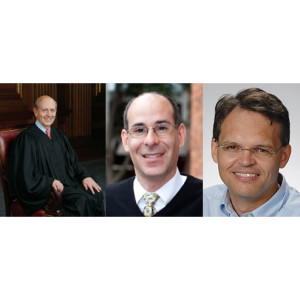Response by Professors Peter J. Smith & Robert W. Tuttle
Geo. Wash. L. Rev. Docket (Oct. Term 2014)
Walker v Texas Division, Sons of Confederate Veterans, Inc., 575 U.S. ___ (2015).
Docket No. 14-144; argued March 23, 2015; June 18, 2015
Slip Opinion | New York Times | SCOTUSblog
In Walker v. Texas Division, Sons of Confederate Veterans, Inc.1 a closely divided Court upheld the decision of the Texas Department of Motor Vehicles Board (“Board”) to reject the respondents’ proposed license plate design featuring a confederate flag.2 The respondents argued that, in light of the wide range of specialty license plate designs that the state had previously approved, the license plates constituted a public forum for private speech, and thus that the denial constituted impermissible viewpoint discrimination under the First and Fourteenth Amendments. The Court disagreed, reasoning that Texas’s specialty license plate program constituted government, rather than private, speech: “When government speaks, it is not barred by the Free Speech Clause from determining the content of what it says.”3 Justice Alito, joined by three others, dissented, agreeing with the respondents that the proposed design reflected private speech and thus that Texas impermissibly discriminated on the basis of viewpoint in rejecting their proposed design.4
The Court relied heavily on a basic intuition that, without a category of speech that is immune from the content- and viewpoint-neutrality rules ordinarily required by the Free Speech Clause, “government would not work.”5 For example, in developing instructions for filing income tax returns, the government has no obligation to include the assertions of those who claim that the government lacks authority to impose an income tax. But that common-sense intuition provides little help in addressing contexts in which the speech arises out of a collaboration between the government and one or more private entities. For example, the Court’s analysis in Walker does not neatly resolve a claim that the government must permit the family of a deceased soldier to include a purely personalized display on his grave marker in a veterans’ cemetery.
Walker involved speech conveying a secular message—the message, that is, conveyed by the Confederate flag—and concerned only the question whether the government’s refusal to permit that speech violated the Free Speech Clause. Many cases arising in this context, however, involve religious speech, and thus implicate both the Free Speech Clause and the Establishment Clause. In his opinion for the Court, Justice Breyer noted that “[c]onstitutional and statutory provisions outside of the Free Speech Clause may limit government speech,” but he did not explicitly mention the Establishment Clause. Nonetheless, it is difficult not to view the dispute between the majority and the dissent in Walker as a proxy for the controversy over government responsibility for the content of religious messages.
In a prior decision, for example, the Board approved a specialty license plate design that depicts three Christian crosses on a hill and the motto “One State Under God.” If indeed the messages conveyed by specialty license plate designs in Texas constitute government speech, as the Court held in Walker, then this design and message give rise to a colorable claim under the Establishment Clause. Under current doctrine, an official embrace of a particular faith group’s religious message violates the Clause.6
Consider the case of the “I Believe” specialty license plate in South Carolina. In 2008, the state legislature enacted a law authorizing the issuance of plates depicting a cross superimposed over a stained-glass window and the phrase “I Believe.” In 2009, a federal district court held that the Act violated the Establishment Clause.7 South Carolina responded by approving an application from a private organization for a substantially similar—and even more overtly Christian—specialty license plate design, based upon an opinion by the state Attorney General concluding that such an action would merely facilitate private speech, rather than constitute government speech. After Walker, however, the mere fact that a private organization proposed the plate does not convert the message into private speech. According to the Court, the messages on the license plates are government speech because license plates “have long communicated messages from the States”; license plate designs are “often identified in the public mind with the State”; and the state “retains direct control over the messages” expressed on the plates.8 As a consequence, the religious themes on the South Carolina “I Believe” plate raise the same questions under the Establishment Clause as those confronted by the district court in 2009.
The Court’s conclusion in Walker that the specialty license plates at issue constitute government speech is not wholly satisfying as a matter of free speech doctrine. But one unmistakable consequence of the decision is to make clear that such cases involving religious speech will now be subject to scrutiny under the Establishment Clause, a consequence that would not follow from the dissent’s view that the plates communicated the speech of private parties.
Under the majority’s approach in Walker, many of the religiously themed specialty license plates that have been approved are constitutionally vulnerable. The “I Believe” plate, for example, promotes Christianity and thus almost certainly offends the most commonly applied standards for Establishment Clause review. Similarly, the “Jesus is Lord” plate proposed in Tennessee presumably offends the Establishment Clause.
For those who are concerned about the proliferation of government sponsored religious messages, however, the Court’s implicit decision in Walker to leave constitutional scrutiny to the Establishment Clause will ultimately offer little relief. The widely noted disagreements among the Justices about the application of the Establishment Clause will at best render uncertain the constitutional status of many religious messages that have appeared on, or been proposed for, specialty license plates. In many cases, those messages will easily survive scrutiny under the Establishment Clause.
For example, Kentucky (among a significant number of states) has adopted a plate with the message “In God We Trust.” Few would believe that this message—which appears on United States currency—offends the Establishment Clause.9 Because that message constitutes government speech when it appears on a state-issued license plate, moreover, the state is under no obligation to approve a plate that advances a contrary message—such as, say, a design proposed by atheists declaring “In Humanity We Trust.”
Indeed, the most controversial specialty license plate designs have involved the message “Choose Life.” Such plates have given rise to three types of disputes: first, the claim (typically in liberal-leaning states) that the state impermissibly denied a proposal for such a plate featuring that message; second, the claim (typically in conservative states) that the state impermissibly issued a plate with that message; and third, the claim (again, typically in conservative states) that the state, having approved a “Choose Life” design, must also approve a plate with a competing message, such as “Pro-Choice.” Under Walker, the first and third claims are no longer colorable, even though most of the lower courts that previously addressed the issue concluded that the denials constituted impermissible viewpoint discrimination. And because the Establishment Clause is now the only effective limit on the state’s discretion to include messages on specialty license plates, the second claim will fail because, although the phrase “Choose Life” has, for many, religious undertones, it is not an expressly religious statement.10
At a time of renewed attention to the divisive character of the Confederate flag, the majority in Walker succeeded in permitting Texas to block its display on state-issued plates.11 But to the extent that the liberal Justices in the majority are concerned about the proliferation of state-sponsored religious messages, their approach in Walker will offer only slight assistance in that project.
Robert W. Tuttle is the David R. and Sherry Kirschner Berz Research Professor of Law and Religion. Professor Tuttle is an expert in Law & Religion and instructs courses in property, trusts and estates, and professional responsibility. Professor Tuttle’s recently published book on the religion clauses of the constitution with Profesor Ira C. Lupu, Secular Government, Religious People (Eerdmans, 2014) is available here.
1. 2015 U.S. Lexis 4063 (U.S. S. Ct., No. 14-144, Decided June 18, 2015).
2. The proposed image is available in the appendix to the Court’s opinion. See Slip op. at App.
3. Id. at 5 (majority opinion).
4. On the same day that the Board rejected the respondents’ proposed design, it approved one commemorating the “Buffalo Soldiers,” a predominantly African-American U.S. Army unit that fought in the “Indian Wars.” Like the Sons of Confederate Veterans’ proposed design, the Buffalo Soldiers’ proposal attracted opposition, from Native Americans, on the ground that the plate was offensive and demeaning. This denial gave rise to the claim of viewpoint discrimination.
5. Slip op. at 5 (majority opinion).
6. See, e.g., McCreary County v. ACLU, 545 U.S. 844 (2005).
7. Summers v. Adams, 669 F. Supp. 2d 637 (D.S.C. 2009).
8. Walker, slip op. at 9-12 (majority opinion).
9. See Lynch v. Donnelly, 465 U.S. 668, 716 (1984) (Brennan, J., dissenting).
10. See Children First Foundation v. Martinez, 2007 U.S. Dist. LEXIS 94944 (N.D. NY Dec. 27, 2007) (rejecting state’s Establishment Clause defense for refusal to issue “Choose Life” specialty plate because the message is not religious in nature).
11. Indeed, this may help to explain why Justice Thomas joined the four liberals in the majority. Cf. Virginia v. Black, 548 U.S. 343, 388 (2003) (Thomas, J., dissenting) (describing cross-burning as a “paradigmatic” example of the “profane”).
Recommended Citation
Peter J. Smith & Robert W. Tuttle, Response, Walker v. Texas Division, Sons of Confederate Veterans, Inc., Geo. Wash. L. Rev. Docket (June 23, 2014), wwww.gwlr.org/walker-v-sons-of-confederate-veterans.



